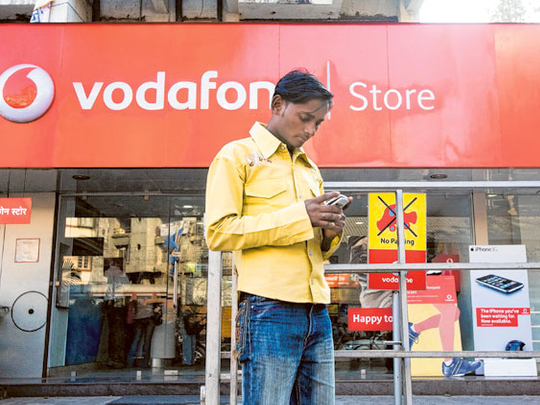
New Delhi: Vodafone Group Plc may win a reprieve in a $2.2 billion (Dh8.08 billion) Indian tax case after a panel opposed a retroactive clause in the nation’s laws that drove away foreign investors and pushed the rupee to a record low.
Retrospective tax demands should only be made in “rarest of rare cases” and changes made to the way capital gains on cross-border deals are taxed should only apply to future transactions, the committee said in a draft report yesterday. Should the government accept the advice, Vodafone won’t be liable for its 2007 purchase of Hutchison Whampoa Ltd’s Indian assets, Ernst & Young LLP and KPMG said.
The recommendations were posted on the finance ministry’s website less than a month after Vodafone expressed willingness to settle the case provided it could just pay the original tax claim and not the penalty and interest. Chief financial officer Andy Halford said in a September 14 interview that he may make a provision to cover legal risks after former finance minister Pranab Mukherjee amended the tax law in March. India’s Supreme Court had ruled in January that the operator isn’t liable and dismissed the government’s case.
Equity, probity
“If the report is fully implemented, then Vodafone will be exonerated entirely,” said Mumbai-based Dinesh Kanabar, chairman of taxes at KPMG’s local unit. “The retrospective amendment, if deemed to be a valid law, would allow the government to proceed against Hutch, not Vodafone. Whether they want to do that is a separate issue.”
The panel, set up by Mukherjee’s successor Palaniappan Chidambaram, seeks to undo some of the amendments to “better reflect principles of equity and probity” in commonly recognised tax laws. The proposals come amid US Treasury Secretary Timothy Geithner’s two-day visit to India, during which he hailed the burst of policy changes Prime Minister Manmohan Singh announced in the past month to lure investment from overseas.
Newbury, England-based Vodafone, the world’s second-argest mobile-phone operator, today fell 0.2 per cent to 179.05 pence as of 8.54am in London. Spokesman Ben Padovan declined to comment on the report.
Geithner discussed the amendments in his meetings with Mukherjee in April after American trade and lobby groups said the move may lead to retroactive levies for a period going as far back as 50 years and deter foreign investment. UK Chancellor of the Exchequer George Osborne criticised the plan, saying it could damage India’s investment climate.
Policy changes
The tax panel, led by Parthasarthi Shome, a former adviser to the finance minister, was set up by Singh in July to shore up confidence as the economy struggled, the rupee tumbled and the odds of a credit-rating downgrade increased.
Singh’s administration started a wave of economic policy changes last month to restrain its fiscal deficit and permit increased investment from abroad in industries such as retailing and aviation, stoking a surge in the rupee and buoying stocks.
The currency has rebounded about 8 per cent from a record low it touched in June, and traded at 53 a dollar as of 11.45am in Mumbai, according to data compiled by Bloomberg. It has advanced 4.5 per cent since September 13, when officials announced a diesel-price rise to pare expenditure on fuel subsidies in the first step of the policy overhaul. The BSE India Sensitive Index has rallied 15 per cent since the end of May.
The recent moves snapped months of inaction that had dimmed India’s outlook. The gridlock contributed to decisions by Standard & Poor’s and Fitch Ratings to cut the outlook on the nation’s credit rating to negative from stable earlier this year, imperiling its investment-grade status.
Spectrum auction
Indian economic growth may weaken to a decade-low this year of 4.9 per cent even as the government pursues a policy revamp, estimates from the International Monetary Fund showed yesterday.
India has also said it may soon finalise the rules for a proposed clampdown on tax avoidance as it considers delaying implementation of a plan that also spooked foreign investors.
The norms for the so-called General Anti-Avoidance Rules, or GAAR, should be ready by the end of the month, Finance Minister Chidambaram said on October 1 after the Shome committee submitted its final report on the measure.
Vodafone, which may be getting ready to participate in a $7 billion spectrum auction in India to expand its user base, said in April that it will pursue international arbitration against the Indian government if the country proceeds with plans to make the operator liable for the tax bill.
Investment treaty
Vodafone’s Dutch unit served a notice of dispute to the Indian government on April 17, invoking an investment treaty between India and the Netherlands.
The panel said the seller making the gains should be liable if the government still opts to levy charges on past deals, whereas Vodafone was the acquirer in the transaction at issue.
“Vodafone is not liable to tax, interest, or penalty,” said Satya Poddar, a tax partner with Ernst & Young based in Gurgaon near New Delhi. “That’s the recommendation.”












